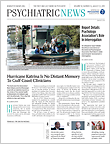By some estimates, up to 25 percent of all women who are pregnant or have given birth will experience a depressive episode within one year of the birth.
In recognition of this risk, the U.S. Preventive Services Task Force—an independent panel of experts that makes recommendations on clinical preventive services to primary care clinicians—in July issued a proposal specifically recommending screening for depression in pregnant and postpartum women, a position in line with the American Academy of Pediatrics and the American College of Obstetricians and Gynecologists.
A study recently published in the Annals of Family Medicine highlights at the importance of repeated depression screenings of new mothers—13.5 percent of women who showed no signs of depression 4 to 12 weeks after childbirth were found to be at high risk when rescreened 6 and 12 months later.
“Continued screening of moms in first-year postpartum is important and will identify patients who were not identified in early postpartum,” said Jennifer Payne, M.D., an associate professor of psychiatry and behavioral sciences at Johns Hopkins and director of Hopkins Women’s Mood Disorders Center. “This is important not only for the mental health of the mother but for the health of the children in her care.” Payne was not involved with the study.
If left untreated, maternal depression can create significant challenges for mothers and their babies, weakening the mother-child bond and slowing an infant’s brain and social development. Babies of mothers who are depressed tend to have slower language development and more social and behavioral problems as they age.
In the current study, Barbara Yawn, M.D., director of the Research Department at the Olmsted Medical Center in Rochester, Minn., and colleagues examined data from the Translating Research Into Practice for Postpartum Depression (TRIPPD) study, which included nearly 2,400 women screened for depression at 4 to 12 weeks’ postpartum at 28 family practices across the United States. While the initial trial focused on women who reported symptoms of depression requiring follow-up, the current analysis centered on the women that did not.
Of the 1,432 women who were found not at risk for depression at 4 to 12 weeks’ postpartum (scored less than 10 on the 9-item Patient Health Questionnaire [PHQ-9]), 1,235 were rescreened at 6 months, revealing 134 women (10.8 percent) at elevated postpartum depression risk in need of further evaluation. Screens of women who were not identified at risk at 4 to 12 weeks’ or 6 months’ postpartum identified an additional 59 women (6 percent of those rescreened) with elevated depression risk at 12 months’ postpartum.
“It must be frightening for a mother to screen negative for postpartum depression shortly after the birth of her child only to find months later that she feels unhappy and nothing interests her,” Yawn said. “While these data are based on postpartum depression screening and not confirmed diagnoses of depression, the findings suggest we need to be reevaluating women.”
While Payne agreed that it makes sense for people on the front line—primary care doctors, OB-GYNs, pediatricians—to be screening mothers and fathers for depression, she noted that screening also creates new challenges for providers, who may feel limited in terms of what they can offer their patients.
According to Yawn, multiple studies have found that women at high risk of postpartum depression referred out for mental health services are lost to follow-up.
“We need to figure out how to get women care in the places they want to go,” Yawn said, noting that an increase in the number of multidisciplinary practices with a psychiatrist and advancing telehealth technology may be possible solutions.
Yawn added, “We need psychiatrists to continue to educate those of us in family medicine on how we can do a better job of delivering and managing care for the more common types of depression in our practices.”
The research was funded by the Agency for Healthcare Research and Quality. ■
“Repeated Depression Screening During the First Postpartum Year” can be accessed
here. “TRIPPD: A Practice-Based Network Effectiveness Study of Postpartum Depression Screening and Management” is available
here.


